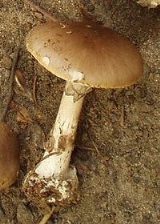
Amanita porphyria
Encyclopedia
Amanita porphyria, also known as the Grey Veiled Amanita, is a fairly common, inedible basidiomycete mushroom
of the genus Amanita
found in Europe
and North America
.
. A. porphyria usually grows near coniferous trees.
Mushroom
A mushroom is the fleshy, spore-bearing fruiting body of a fungus, typically produced above ground on soil or on its food source. The standard for the name "mushroom" is the cultivated white button mushroom, Agaricus bisporus; hence the word "mushroom" is most often applied to those fungi that...
of the genus Amanita
Amanita
The genus Amanita contains about 600 species of agarics including some of the most toxic known mushrooms found worldwide. This genus is responsible for approximately 95% of the fatalities resulting from mushroom poisoning, with the death cap accounting for about 50% on its own...
found in Europe
Europe
Europe is, by convention, one of the world's seven continents. Comprising the westernmost peninsula of Eurasia, Europe is generally 'divided' from Asia to its east by the watershed divides of the Ural and Caucasus Mountains, the Ural River, the Caspian and Black Seas, and the waterways connecting...
and North America
North America
North America is a continent wholly within the Northern Hemisphere and almost wholly within the Western Hemisphere. It is also considered a northern subcontinent of the Americas...
.
Description
The cap is hemispherical when young, later flat. It is 4–10 cm in diameter, greyish brown to brown in colour, usually smooth, sometimes with grey patches. The gills are white and free from the stem. The spores are white. The stem is 5–12 cm high and 1-1.5 cm thick and has a grey to black ring. The stem has a basal bulb. The flesh is white with a smell of radishRadish
The radish is an edible root vegetable of the Brassicaceae family that was domesticated in Europe, in pre-Roman times. They are grown and consumed throughout the world. Radishes have numerous varieties, varying in size, color and duration of required cultivation time...
. A. porphyria usually grows near coniferous trees.

